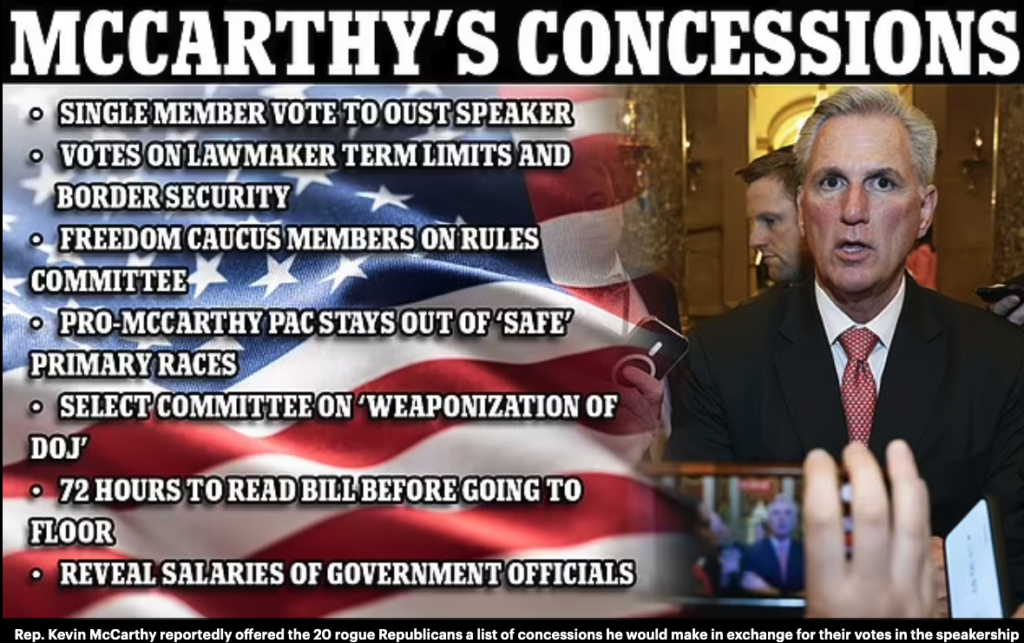McCarthy Agrees to Launch Select Subcommittee on the Weaponization of the DOJ

Newly elected Speaker of the House Kevin McCarthy has agreed to launch a subcommittee on the weaponization of the Department of Justice.
The “Select Subcommittee on the Weaponization of the Federal Government as a select investigative subcommittee of the Committee on the Judiciary” will focus on DOJ targeting and the unconstitutional Biden Administration censorship of of American citizens.
This will be modeled after the “Church Committee” of the 1970s and will include Rep Thomas Massie:
Other concessions are reported as:
Single member can move to ‘vacate the chair’
If McCarthy thought overcoming a band of holdouts was tough this week, things could get even harder if he becomes speaker.
A single member would get to move to ‘vacate the chair.’ This reverts to prior procedure, which Freedom Caucus to threaten former Speaker John Boehner.
McCarthy had already agreed to a five-vote requirement to make the motion, which sets up essentially a vote of no-confidence in the Speaker, and agreed to lower it to a single lawmaker.
Hard line on debt limit
McCarthy has agreed to take a hard line on increasing the statutory debt limit – which Congress must lift to accommodate spending it has agreed to through appropriations.
Lawmakers weren’t direct about what the exact deal was. But one of the holdouts who flipped, Rep.-elect Ralph Norman, had demanded a very tough line.
‘Is he willing to shut the government down rather than raise the debt ceiling? That’s a non-negotiable item,’ Norman said before switching to back McCarthy.
Rep.-elect Chip Roy (R-Texas) wouldn’t reveal the precise nature of the deal, which was reported by the Washington Post and other outlets. ‘I’m not going to get specific about that because I’m still having conversations here for a few hours. But what I’ll say is, it’s safe to say is that we believe there are specific concrete limits on spending attached to the debt ceiling increase,’ he told reporters, blasting the $1.7 trillion omnibus bill that passed as the last major act of the Democratic Congress.
That suggests the House may try to force the administration into accepting spending cuts – something Democrats are sure to resist.
Votes on term limits and border security
The holdouts reportedly got a pledge to get floor votes on term limits and border security. The former in particular could drive a wedge through the conference. McCarthy himself was elected to the House in 2006.
The legislation would likely die in the Senate, where they would be subject to a filibuster.
Open Primaries
The Conservative Leadership Fund, a PAC backed by McCarthy, brokered a deal with the Club for Growth that will impact Republicans that join the House in the future.
The CLF committed to stay out of ‘open’ primaries when a lawmakers vacates a seat. That gives arch conservatives a chance to prevail in a primary without getting pounded by leadership, which sometimes weighs in on behalf of candidates deemed more ‘electable.’
‘CLF will not spend in any open-seat primaries in safe Republican districts and CLF will not grant resources to other super PAC’s to do so. CLF has never spent a dollar against a Republican incumbent before and obviously will continue that policy in the future,’ according to a statement on the Club for Growth web site. The group has backed many of the conservative holdouts. The group threw its support to McCarthy, assuming the terms of the deal held.
Appropriations
McCarthy reportedly agreed to allow ‘open rules’ on spending measures, which could lead to lengthy debates and efforts to zero out funding for programs unpopular with Republicans.
But the votes can also give Democrats weapons to use in campaign ads, and may spilt GOP appropriators from Freedom Caucus members.
According to Politico, the deal includes a commitment to bring up stand-alone appropriations bills. Conservatives loathe the ‘omnibus’ bills that wrap multiple spending bills together when shutdowns loom. Passing individual bills is something both parties routinely try, and fail, to do by the end of the fiscal year.
Another commitment was to allow votes on spending ‘earmarks,’ projects inserted by individual members. House Republicans brought back the practice in 2021 by a vote in their conference. According to Politico, it wasn’t clear if they would get voted on individually or as a bloc.
Though despised by good government groups, leadership in both parties has relied on the practice to secure support for legislation.
Discretionary spending cap
Another concessions is a cap on discretionary spending, CNN reported. although spending levels are usually negotiated by both chambers – and get influenced by the president’s budget requests.
‘Weaponization’ of DOJ and Select Committee on CCP
Republicans are girding to take on the Biden administration, and the rebels forced a commitment to set up a committee on the ‘weaponization’ of the government. The idea had been floated as a subcommittee on the House Judiciary Committee. Its exact structure and membership was uncertain.
According to the House Rules package leaders prepared, the a procedure creates a ‘Select Subcommittee on the Weaponization of the Federal Government as a select investigative subcommittee of the Committee on the Judiciary.’ It also creates a Select Committee ‘on the Strategic Competition Between the United States and the Chinese Communist Party.’





